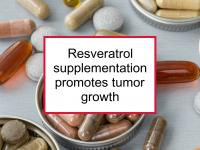Resveratrol has been found to inhibit the growth of breast cancer cells in numerous studies. Resveratrol has also been shown to increase the effectiveness of a variety of breast cancer treatments. Efforts are under way to develop drugs based on resveratrol that can safely be used to treat breast cancer in combination with traditional chemotherapy drugs.
On the other hand, there is some evidence that resveratrol supplements could promote breast cancer growth under some circumstances, suggesting that food sources of resveratrol are a safer option for breast cancer patients and survivors. Now a new study has reported that resveratrol supplementation can promote triple negative (ER-/PR-/HER2-) tumor growth in a mouse model of breast cancer.
Food sources of resveratrol
Red grapes, blueberries, blackberries and cranberries and their juices are very good sources of resveratrol. Red wine is not a desirable source of resveratrol because the breast cancer-promoting effects of its alcohol content appears to outweigh the beneficial effects of its resveratrol and other polyphenol content, according to available evidence.
Latest research finds resveratrol can promote TN tumor growth
The study referenced at the beginning of this news story was designed to investigate the effects of various resveratrol concentrations in a mouse model of triple negative breast cancer. The authors and other researchers previously reported that resveratrol can both promote and inhibit hormone receptor positive breast cancer, depending on various factors, since it can have either estrogenic or antiestrogenic activities. However, the inhibitory effects of resveratrol often have been reported from cell studies using high concentrations that could not safely be achieved in animals or humans.
In the current study, the authors studied the effects of resveratrol on estrogen receptor negative (ER-) breast cancer, which presumably are not expected to be affected by any potential estrogenic effects of resveratrol. To conduct the study, tumors were established in groups of immunocompromised mice with either the low metastatic MDA-MB-231 triple negative breast cancer cell line or the highly metastatic MDA-MB-435 triple negative cell line. The authors then assessed the effects of 0, 0.5, 5 and 50 mg/kg of body weight of resveratrol on the growth of mammary tumors in the mice. Resveratrol supplementation was found to result in increased mammary tumor growth and metastasis at all of the concentrations tested in both sets of mice.
The authors also measured the activity of the cell migration/invasion regulator Rac in tumors from resveratrol-treated mice. The authors previously demonstrated that Rac is regulated by resveratrol in breast cancer cells. In the current study, resveratrol treatment was found to significantly induce Rac activity in the mammary tumors. There was also an increase in the expression of other tumor promoting molecules. The authors conclude that low concentrations of resveratrol might have the potential to promote breast cancer. The study highlights the importance of more firmly establishing resveratrol's concentration-dependent effects before it can be used as a dietary supplement for breast cancer patients, according to the authors.
